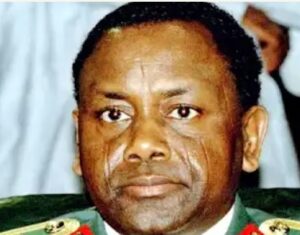Nigeria’s Most Controversial Political Figures: A Historical Perspective
Nigeria’s Most Controversial Political Figures: A Historical Perspective

Nigeria’s political history is rich with figures whose decisions have sparked intense debate, drawing both admiration and criticism. Below is a detailed look at some of the most polarizing politicians in Nigeria’s past, including current President Bola Ahmed Tinubu. According to Eyes of Lagos, here’s a rundown of key controversial figures:
1. General Sani Abacha (1943–1998)
Sani Abacha ruled Nigeria as a military dictator from 1993 until his death in 1998. His regime was notorious for its authoritarian nature, marked by gross human rights violations, political suppression, and rampant corruption. Numerous opponents were jailed or executed, and his government was notorious for misappropriating billions of dollars, much of it hidden in foreign bank accounts.
2. General Ibrahim Babangida (Born 1941)
Ibrahim Babangida governed Nigeria as a military leader from 1985 to 1993. His time in power was characterized by political instability, economic mismanagement, and corruption allegations. His most controversial move was the annulment of the 1993 presidential elections, considered the fairest in Nigeria’s history, which led to widespread unrest and set the stage for Sani Abacha’s dictatorship.
3. Diezani Alison-Madueke (Born 1960)
Diezani Alison-Madueke served as Nigeria’s Minister of Petroleum Resources from 2010 to 2015 and became infamous for her involvement in large-scale corruption. In 2023, the United States agreed to return $52.88 million in assets linked to her, underscoring the global dimension of her controversial tenure.
4. James Ibori (Born 1958)
James Ibori, the former governor of Delta State (1999–2007), was convicted in the UK for laundering an estimated $250 million. His case highlights the entrenched corruption within Nigeria’s political elite and the challenges of holding such figures accountable domestically.
5. General Yakubu Gowon (Born 1934)
Yakubu Gowon led Nigeria through the Nigerian Civil War from 1966 to 1975. Although his leadership preserved the country’s unity, his administration faced criticisms for human rights violations and poor management of oil wealth during the economic boom that followed the war.
6. General Olusegun Obasanjo (Born 1937)
Olusegun Obasanjo served as both Nigeria’s military head of state (1976–1979) and civilian president (1999–2007). His civilian rule is credited with economic reforms but also marred by allegations of corruption, political favoritism, and attempts to manipulate the constitution for a third term.
7. General Muhammadu Buhari (Born 1942)
Muhammadu Buhari served as a military ruler from 1983 to 1985 before returning to power as a civilian president in 2015. His first tenure was marked by authoritarian policies and human rights abuses. His second term saw significant criticism over worsening security, economic struggles, and claims of nepotism.
8. General Murtala Mohammed (1938–1976)
Murtala Mohammed’s leadership from 1975 until his assassination in 1976 was marked by swift and often harsh decisions. He initiated key reforms aimed at reducing corruption, but his autocratic style led to political unrest.
9. Nnamdi Azikiwe (1904–1996)
Nnamdi Azikiwe, Nigeria’s first president (1963–1966), was a prominent independence leader. However, his presidency was marked by political instability, ethnic conflicts, and allegations of electoral fraud, all of which contributed to the military coup that ended the First Republic.
10. Bola Ahmed Tinubu (Born 1952)
Since becoming Nigeria’s president in May 2023, Bola Ahmed Tinubu has been at the center of several controversies:
Educational Qualifications: Questions surrounding the authenticity of Tinubu’s academic credentials gained attention, but investigations, including by the BBC, found no evidence of forgery.
Economic Reforms: His government introduced major economic reforms, including removing fuel subsidies and adjusting the naira’s exchange rate. These measures, intended to stabilize the economy, caused a sharp rise in living costs and sparked protests, which were met with heavy security crackdowns.
Human Rights: Amnesty International criticized Tinubu’s administration for its human rights record, particularly for the detention of protesters, including children. In response, he intervened to release 29 minors who had been sentenced to death for protesting against rising living costs.
These political figures have had lasting impacts on Nigeria, shaping the country’s governance and development through their controversial actions and policies. Their legacies continue to influence the nation’s future trajectory.
TRENDING SONGS
 NPMA Appeals to Nigerian Government for Compensation After Lagos Market Fire
NPMA Appeals to Nigerian Government for Compensation After Lagos Market Fire
 Rest Every Four Hours, FRSC Issues Safety Guide for Fasting Motorists
Rest Every Four Hours, FRSC Issues Safety Guide for Fasting Motorists
 NNPC Boss Ojulari Bags UK Energy Institute Fellowship
NNPC Boss Ojulari Bags UK Energy Institute Fellowship
 Shock in Anambra: Bride Disappears Moments Before Wedding
Shock in Anambra: Bride Disappears Moments Before Wedding
 Nigerian Woman Returns ₦330 Million Accidentally Credited to Her Account
Nigerian Woman Returns ₦330 Million Accidentally Credited to Her Account
 APC Don Reach Morocco?’ VeryDarkMan Reacts to Seyi Tinubu Poster
APC Don Reach Morocco?’ VeryDarkMan Reacts to Seyi Tinubu Poster
 Bride Breaks Down in Tears as Wedding Meals Were Kept Secretly While Guests Go Home Hungry
Bride Breaks Down in Tears as Wedding Meals Were Kept Secretly While Guests Go Home Hungry
 Odogwu by Day, Robber by Night: How Marriage Joy Turned Into Tragedy
Odogwu by Day, Robber by Night: How Marriage Joy Turned Into Tragedy
 Nigerian Officials Allegedly Pocket N4–6B Weekly Through Smuggling Cartels at Seme–Badagry Border
Nigerian Officials Allegedly Pocket N4–6B Weekly Through Smuggling Cartels at Seme–Badagry Border
 Ahmad Yerima: Naval Officer to Face No Sanctions After Clash with Wike – Matawalle
Ahmad Yerima: Naval Officer to Face No Sanctions After Clash with Wike – Matawalle
Share this post with your friends on ![]()













